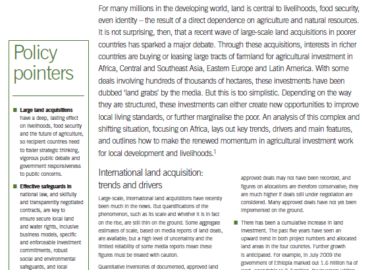The increased volatility of prices of agricultural commodities on international markets and the merger between the energy and food commodities markets have led to a sudden surge of interest in the acquisition or lease of farmland in developing countries. The result is “land-grabbing”: a global enclosure movement in which large areas of arable land change hands through deals often negotiated between host governments and foreign investors with little or no participation from the local communities who depend on access to those lands for their livelihoods. While recognizing that these transactions should be more closely scrutinized, some commentators see opportunities in this development, either because it means more investment in agriculture and thus productivity gains, or because it will accelerate the development of a market for land rights that could benefit current land users, provided their property rights are recognized through titling schemes. This Article questions these views. Based on an analysis of the relationship to property rights of different categories of land users in the rural areas in developing countries, this Article argues that the poorest farmers will be priced out from these emerging markets for land rights, and that the interests of those depending on the commons will be ignored. I suggest that there are other ways to protect security of tenure: anti-eviction laws, tenancy statutes, and policies aimed at ensuring more equitable access to land. Although measures such as these require a disaggregation of property rights and an abandonment of the Western understanding of property as necessarily implying transferability, they may offer more promising solutions to the rural poor.
Author: Olivier De Schutter
Published by: Harvard International Law Journal (2011)
The Green Rush_De-Schutter


